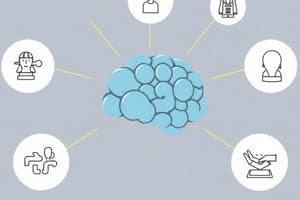Podcast
Questions and Answers
What does lethargy refer to in the context of consciousness levels?
What does lethargy refer to in the context of consciousness levels?
- An inability to be aroused
- A complete lack of awareness
- A mild depressed level of alertness (correct)
- A state of high alertness
What can result from unsatisfied oral needs during the oral stage of development?
What can result from unsatisfied oral needs during the oral stage of development?
- Oral fixation (correct)
- Increased tidiness
- Balanced personality
- Overachievement
In the context of the ego in post-Freudian theory, what does the body-ego represent?
In the context of the ego in post-Freudian theory, what does the body-ego represent?
- The psychological needs for identity and worth
- The moral judgments of an individual
- The physical self distinguishable from others (correct)
- The connection between the socio-cultural self and others
Which of the following best describes Carl Rogers' approach to therapy?
Which of the following best describes Carl Rogers' approach to therapy?
According to individual psychology, what is deemed as the ultimate goal of the human soul?
According to individual psychology, what is deemed as the ultimate goal of the human soul?
How does Yerkes-Dodson Law relate physiological arousal to performance on tasks?
How does Yerkes-Dodson Law relate physiological arousal to performance on tasks?
Which statement accurately reflects the nature of unconscious motivation?
Which statement accurately reflects the nature of unconscious motivation?
Which psychological concept is primarily focused on achieving personal potential and goals?
Which psychological concept is primarily focused on achieving personal potential and goals?
What distinguishes primary drives from secondary drives?
What distinguishes primary drives from secondary drives?
Which of the following represents a key aspect of Herzberg's Two-Factor Model?
Which of the following represents a key aspect of Herzberg's Two-Factor Model?
What need according to McClelland’s theory is associated with the desire for warm and friendly relationships?
What need according to McClelland’s theory is associated with the desire for warm and friendly relationships?
How does the locus of control influence interpretation of negative behaviors?
How does the locus of control influence interpretation of negative behaviors?
What does the Expectancy Theory primarily explain about individual behavior in organizations?
What does the Expectancy Theory primarily explain about individual behavior in organizations?
Which of the following accurately describes the differences between extroverts and introverts in relation to arousal theory?
Which of the following accurately describes the differences between extroverts and introverts in relation to arousal theory?
Which motivational factor involves underlying sexual and aggressive drives according to Freudian concepts?
Which motivational factor involves underlying sexual and aggressive drives according to Freudian concepts?
What is the primary role of motivation according to the content provided?
What is the primary role of motivation according to the content provided?
According to incentive theory, which statement reflects how individuals engage in behavior?
According to incentive theory, which statement reflects how individuals engage in behavior?
In McClelland's Needs Theory, which of the following is not one of the three most important needs?
In McClelland's Needs Theory, which of the following is not one of the three most important needs?
Which concept describes the necessity for order and beauty in motivation?
Which concept describes the necessity for order and beauty in motivation?
What component is NOT included in Madga B.'s motivation model?
What component is NOT included in Madga B.'s motivation model?
What type of needs does Herzberg categorize as 'hygiene' factors?
What type of needs does Herzberg categorize as 'hygiene' factors?
What is a contributing factor to higher motivation and performance in individuals?
What is a contributing factor to higher motivation and performance in individuals?
In Adam's Equity Theory, feelings of being treated equitably lead to what behavior?
In Adam's Equity Theory, feelings of being treated equitably lead to what behavior?
Which hormone is specifically associated with male physiological urges?
Which hormone is specifically associated with male physiological urges?
What psychological motive primarily involves the need for social connections?
What psychological motive primarily involves the need for social connections?
In which theory does behavior change through reinforcement methods?
In which theory does behavior change through reinforcement methods?
Which of the following best describes procedural equity?
Which of the following best describes procedural equity?
What does dependency as a psychological motive emphasize?
What does dependency as a psychological motive emphasize?
Which type of attribution explains performance in terms of luck?
Which type of attribution explains performance in terms of luck?
What psychological motive relates to the desire for physical and social stability?
What psychological motive relates to the desire for physical and social stability?
What is a critical aspect of the approach/avoidance goal framework?
What is a critical aspect of the approach/avoidance goal framework?
What is the primary focus of humanistic theory in the study of human behavior?
What is the primary focus of humanistic theory in the study of human behavior?
What does the latency stage of development primarily involve?
What does the latency stage of development primarily involve?
Which of the following is NOT a defense mechanism proposed by Freud?
Which of the following is NOT a defense mechanism proposed by Freud?
What do the Oedipus and Electra complexes represent in psychodynamic theory?
What do the Oedipus and Electra complexes represent in psychodynamic theory?
According to Freud, which component of personality is responsible for mediating between the desires of the id and the moral standards of the superego?
According to Freud, which component of personality is responsible for mediating between the desires of the id and the moral standards of the superego?
Which stage of Freud's theory focuses on adolescent sexual experimentation?
Which stage of Freud's theory focuses on adolescent sexual experimentation?
Which term describes the set of inborn patterns of behavior according to Freud?
Which term describes the set of inborn patterns of behavior according to Freud?
What does the concept of 'level of consciousness' measure?
What does the concept of 'level of consciousness' measure?
Which of the following insight is NOT associated with humanistic theory?
Which of the following insight is NOT associated with humanistic theory?
Freud's psychoanalytic theory emphasizes personality formation through conflicts among which components?
Freud's psychoanalytic theory emphasizes personality formation through conflicts among which components?
Flashcards
Cultural Differences in Body Language
Cultural Differences in Body Language
The outward expression of emotions through body language can have different meanings in different cultures. For example, in some cultures, avoiding direct eye contact with someone in authority is a sign of respect, while in others it may be seen as disrespect.
What is Motivation?
What is Motivation?
Motivation is an internal state that drives behavior towards achieving a desired goal. It includes needs, desires, and wants that energize and direct actions.
Yerkes-Dodson Law
Yerkes-Dodson Law
The Yerkes-Dodson Law suggests that performance on a task is best when there is an optimal level of arousal. Too little arousal can lead to boredom and lack of focus, while too much arousal can lead to anxiety and stress.
Everybody is Motivated
Everybody is Motivated
Signup and view all the flashcards
Drive Theory
Drive Theory
Signup and view all the flashcards
Conscious vs. Unconscious Motivation
Conscious vs. Unconscious Motivation
Signup and view all the flashcards
Internal vs. External Locus of Control
Internal vs. External Locus of Control
Signup and view all the flashcards
Freud's Concept of Motivation
Freud's Concept of Motivation
Signup and view all the flashcards
McClelland's Needs Theory
McClelland's Needs Theory
Signup and view all the flashcards
Herzberg's Two-Factor Model
Herzberg's Two-Factor Model
Signup and view all the flashcards
Expectancy Theory
Expectancy Theory
Signup and view all the flashcards
Self-Esteem (ES)
Self-Esteem (ES)
Signup and view all the flashcards
Cognitive (CO)
Cognitive (CO)
Signup and view all the flashcards
Aesthetic (AE)
Aesthetic (AE)
Signup and view all the flashcards
Self-Actualization (SA)
Self-Actualization (SA)
Signup and view all the flashcards
Transcendence (TR)
Transcendence (TR)
Signup and view all the flashcards
Avoidance Goal
Avoidance Goal
Signup and view all the flashcards
Adams' Equity Theory
Adams' Equity Theory
Signup and view all the flashcards
Procedural Equity
Procedural Equity
Signup and view all the flashcards
Distributive Equity
Distributive Equity
Signup and view all the flashcards
Behavioral Theory
Behavioral Theory
Signup and view all the flashcards
Attribution Theory
Attribution Theory
Signup and view all the flashcards
Affiliation Motive
Affiliation Motive
Signup and view all the flashcards
Status Motive
Status Motive
Signup and view all the flashcards
Dependency Motive
Dependency Motive
Signup and view all the flashcards
Affection Motive
Affection Motive
Signup and view all the flashcards
Lethargy
Lethargy
Signup and view all the flashcards
Ego
Ego
Signup and view all the flashcards
Body Ego
Body Ego
Signup and view all the flashcards
Ego ideal
Ego ideal
Signup and view all the flashcards
Ego Identity
Ego Identity
Signup and view all the flashcards
What is the Id?
What is the Id?
Signup and view all the flashcards
What is the Ego?
What is the Ego?
Signup and view all the flashcards
What is the Superego?
What is the Superego?
Signup and view all the flashcards
What is Psychoanalytic Theory?
What is Psychoanalytic Theory?
Signup and view all the flashcards
What are Instincts?
What are Instincts?
Signup and view all the flashcards
What are Drives?
What are Drives?
Signup and view all the flashcards
What is the Oral Stage?
What is the Oral Stage?
Signup and view all the flashcards
What is the Anal Stage?
What is the Anal Stage?
Signup and view all the flashcards
What is the Phallic Stage?
What is the Phallic Stage?
Signup and view all the flashcards
What are Ego Defense Mechanisms?
What are Ego Defense Mechanisms?
Signup and view all the flashcards
Study Notes
Learning
- Learning is a relatively permanent change in behavior resulting from practice, experience, or training.
- Key elements of learning include changes in behavior, changes occurring through practice or experience, and a relatively permanent effect that lasts for a long time.
Theories of Learning
- Connectionism (Thorndike): Learning involves forming connections or bonds between stimuli and responses.
- Classical Conditioning (Pavlov): A neutral stimulus gains the ability to elicit a response because it's paired with an unconditioned stimulus. This learning is through association.
- Operant Conditioning (Skinner): Learning occurs through consequences. A behavior that's followed by a reinforcing consequence is more likely to be repeated, while a behavior followed by a punishing consequence is less likely to be repeated. This learning is a three-part sequence: antecedents, behavior, and consequences.
- Consequences: Provide reinforcement (increasing the likelihood of behavior) or punishment (decreasing the likelihood of behavior).
- Positive Reinforcement: Increases behavior by adding a desirable stimulus.
- Negative Reinforcement: Increases behavior by removing an unpleasant stimulus.
- Primary Reinforcement: naturally rewarding stimulus
- Secondary Reinforcement: becomes rewarding through association with primary reinforcement
- Punishment: Decreases behavior by adding an unpleasant stimulus or removing a desirable stimulus.
Elements of Classical Conditioning
- Unconditioned Stimulus (UCS): A stimulus that naturally and automatically triggers a response.
- Unconditioned Response (UCR): The automatic response to the unconditioned stimulus.
- Conditioned Stimulus (CS): A previously neutral stimulus that, after becoming associated with the UCS, now triggers a conditioned response.
- Conditioned Response (CR): The learned response to the conditioned stimulus.
Laws of Learning
- Readiness: Learning occurs when the learner is psychologically and physiologically prepared.
- Exercise: Repetition and rehearsals aid learning.
- Effect: Consequences of a response influence whether the behavior will occur again (favorable/satisfying or unfavorable/unsatisfying).
Memory
- Sensory Memory: Brief storage that immediately follows initial stimulation of a receptor. Holds many items; very brief retention (visual: 3 seconds; auditory: 0.2 seconds). Needs attention to transfer to working memory.
- Working Memory/Short-term Memory: Holds information we are currently aware of or consciously thinking about. Limited capacity (7-8 items); brief storage (about 30 seconds).
- Long-term Memory: Preserves unlimited items of information over long periods; unlimited capacity and duration (thought to be permanent).
Sensory Memory Types
- Iconic Memory: Visual sensory memory (holds visual information up to a second)
- Echoic Memory: Auditory sensory memory (holds auditory information for 1-2 seconds)
- Haptic Memory: Touch information
- Gustric Memory: Taste information
- Olfactic Memory: Smell information
Memory Processes
- Encoding: Transforming sensory input into a code.
- Storage: Encoding information into a form that is retrievable over time.
- Retrieval: Recovering stored information from memory storage.
Memory Models
- Information-Processing Model: Stages include encoding, storage and retrieval.
Memory Theories
- Encoding Failure: Failure to properly encode information, hindering its retrieval.
- Interference: One memory interfering with ability to retrieve another, new memories interfering with old memories (Retroactive); old memories interfering with new memories (Proactive).
- Motivated Forgetting: Consciously or subconsciously keeping undesirable memories out of awareness.
- Retrieval Failure: Inability to locate stored information, even if it exists,
- Decay: Memories fade away over time if not frequently used.
Forgetting
- Retrieval Failures: Difficulty in accessing stored information.
- Encoding Failures: Information was never fully encoded.
- Interference: Other memories or events interfere with retrieval.
- Motivated forgetting: Conscious or unconscious suppression of unpleasant memories.
- Decay: Fading of memory over time due to disuse.
Other Learning Models
- Observational Learning (Bandura): Learning by observing others and imitating their behaviors.
Other Theories of Intelligence
- Spearman (g factor): General intelligence (g factor) influences performance across different tasks.
- Thurstone: Multiple intelligences, separate abilities.
- Gardner: Multiple intelligences including verbal-linguistic, logical-mathematical, spatial, bodily-kinesthetic, musical, interpersonal, intrapersonal, and naturalist.
- Sternberg: Three types of intelligence: analytic, creative, and practical.
Emotions
- Elements of Emotions: Bodily response, expression, and feelings.
- Theories of Emotions:
- James-Lange Theory: Emotions follow bodily responses.
- Cannon-Bard Theory: Emotion and bodily reactions occur simultaneously.
- Schachter-Singer Two-Factor Theory: Emotions need both arousal and a cognitive interpretation of that arousal.
- Evolutionary Perspective: Emotions are functional for survival.
- Areas of Emotions: Facial expressions, brain regions and pathways, autonomic nervous system.
- Classification of Emotions: Primary emotions, mixed emotions
- Motivations: Internal states that activate and direct behavior.
- Theories of Motivation: Instinct, homeostasis, arousal, incentive, Maslow's hierarchy of needs.
Personality
- Personality: Enduring patterns of thoughts, feelings, and behaviors that distinguish individuals from one another.
- Theories of Personality:
- Trait Theory: Identifying and measuring individual personality characteristics (e.g., Big Five model).
- Psychoanalytic Theory (Freud): Personality is formed from conflicts among the id, ego, and superego.
- Humanistic Theory: Focuses on individual's experience, choices, and potential.
- Neo-Freudian Theories: Emphasize social and cultural factors in personality development.
Assessing Personality
- Methods:
- Objective Tests (inventories): Written self-report questionnaires.
- Projective Tests: Ambiguous stimuli, interpreted to reveal unconscious motives.
- Behavioral Assessments: Observing and recording behavior in certain situations.
Important Concepts
- Locus of Control: Extent to which individuals believe they can control their own lives (internal and external factors).
- Self-Efficacy: Belief in one's ability to succeed in a specific situation.
Studying That Suits You
Use AI to generate personalized quizzes and flashcards to suit your learning preferences.



